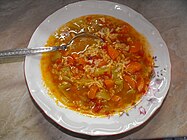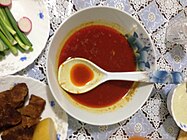Chorba
 | |
| Alternative names | Shurbah, Shorwa, Čorba, Çorba |
|---|---|
| Type | Soup or stew |
| Region or state | Balkans, Central Europe, Eastern Europe, Central Asia |
Chorba or shorba, refers to several kinds of soup or stew found in national cuisines across the Balkans, Central Europe, Eastern Europe, Central Asia, Middle East and the Indian subcontinent. It is often prepared with added ingredients but served alone[1] as a broth or with bread.[2]
Types[]
- Shorwa is a traditional Afghan dish which is a simple dish which is usually mixed with bread on the dastarkhān.[3] It is a long process and a pressure cooker is usually used as it reduces the waiting to 2 hours. The main ingredients for shorwa are potatoes, beans and meat.[4] It is commonly served with Afghan bread.[5]
- Ciorbă is a name used to refer to chorba used in Moldova and Romania consisting of various vegetables and meat and lovage is usually used. Borș is a sour soup that is used in the Moldova region.[6] It is also has beneficial health effects.[7] It is served hot to stimulate digestion and be effective against colds.[8] There are several types of this dish, such as ciorbă de perișoare, leek soup, Romanian borscht, and borș de burechiușe.
Spelling variants[]
Chorba, or shorba, is variously derived from the Arabic word Shurbah[9][10]meaning gravy[11] or from a Persian term شوربا from shor ("salty, brackish") and ba/ab, آب، ما ("water/stew")[12] or from a hypothetical cognate word common to Arabic and Persian.[13] Shorwa means "soup" in Persian/Pashto.
Chorba is also called shorba (Persian: شوربا, Arabic: شوربة, Amharic: ሾርባ), sho'rva (Uzbek: шўрва), shorwa (Pashto: شوروا), chorba (Bulgarian: чорба), čorba (Bosnian), ciorbă (Romanian), shurpa (Russian: шурпа), shorpa (Uighur: شورپا, шорпа), çorba (Turkish), shorpo (Kyrgyz: шорпо) and sorpa (Kazakh: сорпа).[citation needed] In the Indian subcontinent, the term shorba in Hindi (Hindi: शोरबा) simply means gravy. It is a Mughlai dish and it has vegetarian forms such as tomato shorba.
Varieties[]
Bosnian čorba and somun bread
Bulgarian чорба

Kyrgyz shorpo
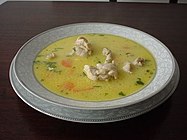
Serbian čorba
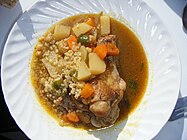
Algerian chorba
Traditional Afghan shorwa
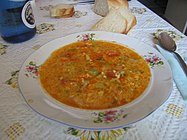
Romanian ciorbă

Montenegrin čorba
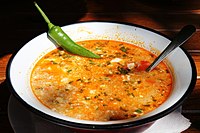
Romanian beef ciorbă
See also[]
- List of soups
- List of stews
References[]
| Wikimedia Commons has media related to Chorba. |
- ^ "What is Shorba and why is it good for you in winter". Entertainment Times. India. 2019-12-27. Retrieved 2021-05-25.
- ^ Roden, Claudia (1974). A Book of Middle Eastern Food. United States: Random House, Inc., New York. p. 109. ISBN 0394-71948-4.
- ^ Bradnock, Robert W. (1994). South Asian Handbook. Trade & Travel Publications. ISBN 9780844299808.
- ^ "Shorwa-E-Tarkari (Meat & Veg Soup)". KitchenRecipes.
- ^ "Shorwa-E-Tarkari (Meat & Veg Soup) | Afghan Kitchen Recipes".
- ^ "Teorii de istorie culinară care ne dezamăgesc: borşul şi mujdeiul, singurele alimente cu adevărat româneşti. Micii inventaţi de Cocoşatu' – un mit urban". adevarul.ro. July 30, 2015. Retrieved 2020-03-17.
- ^ "Supa şi ciorba: scurtă istorie". www.historia.ro (in Romanian). Retrieved 2020-03-17.
- ^ "Ce ciorbă preferă să mănânce românii". A1.RO (in Romanian). Retrieved 2020-03-17.
- ^ Marks, Gil (2010-11-17). Encyclopedia of Jewish Food. HMH. ISBN 9780544186316.
- ^ "What is Shorba and why is it good for you in winter". Entertainment Times. India. 2019-12-27. Retrieved 2021-05-25.
- ^ Paniz, Neela (2015-11-05). Indian Slow Cooker. Ebury Publishing. ISBN 9781473528673.
- ^ Alan Davidson (21 September 2006). The Oxford Companion to Food. OUP Oxford. pp. 2055–. ISBN 978-0-19-101825-1.
- ^ Khan, Abdul Jamil (2006). Urdu/Hindi: An Artificial Divide: African Heritage, Mesopotamian Roots, Indian Culture & Britiah Colonialism. Algora Publishing. ISBN 9780875864396.
- Turkish soups
- Turkish words and phrases
- Bosnia and Herzegovina cuisine
- Indian cuisine
- Kazakhstani cuisine
- Kyrgyz cuisine
- Pakistani soups and stews
- Arab cuisine
- Uzbekistani cuisine
- Romanian cuisine
- Moldovan cuisine
- Uyghur cuisine
- Tajik cuisine
- Soviet cuisine
- Bulgarian cuisine
- Iranian soups

